According to recent statistics, around 165 million 60 kg. (122 lb.) bags of coffee are consumed worldwide annually. That's a lot of coffee – and that doesn't take into consideration all the other forms of caffeine we're taking in: soda, chocolate, energy drinks, tea, and many other niche products.
We all know the cognitive benefits of caffeine, plus its ability to fight off fatigue and tiredness. But did you know that there are extensive athletic benefits as well? Across a wide-ranging mix of sports, and for all manner of athletes: caffeine works.
In this post, we're going to examine the relationship between coffee, caffeine, and exercise performance. So grab your favorite form of caffeine and let's dig in!

When people hear the word "caffeine," the first thing that comes to mind is its effects on stimulation, attentiveness, and tiredness. And it's true – caffeine and coffee have a wide range of health effects – many related to attention and fatigue.
Caffeine is a natural psychoactive stimulant that stimulates your central nervous system and brain by helping keep you alert and remain active. It's naturally found in leaves, nuts, and some plants' seeds – somewhere around 60 plants have been identified which produce caffeine.
According to a study conducted by a Western Michigan scientist, at least 30 plants (out of ~ 300,000 flowering plants of different species) produce caffeine. Others put the number closer to 30. The reason plants have caffeine isn't known for 100% certain – but it may be as a pollinator attractor or perhaps a defense mechanism against insects.
The caffeine in some plants can poison plant pests and herbivores. This ends up discouraging them from attacking the plant again... if they survive the caffeine intake. Since caffeine is also toxic to the plant's cell, it's stored in individual cell compartments to keep it at distance from other cells.
Drinking caffeine, certainly in the form of coffee or tea, causes many health effects in the body. Some of these are:
Plenty of studies have found that drinking caffeine regularly can help improve your mental performance, especially your concentration, alertness, and attention. This is because caffeine suppresses the effects of adenosine, the neurotransmitter associated with sleepiness.
Scientists also discovered that there's a direct relation to the dose of caffeine you consume and your mental performance. There's just more caffeine around then to interfere with adenosine uptake.
For example, higher caffeine doses – up to a point – can aid in improving your cognitive speed, improve accuracy and alertness, and decrease fatigue. Going too high has its downsides, though, which we'll discuss a bit later.
Another positive effect of drinking caffeine is improving heart health. Research studies show that consuming coffee in reasonable doses can aid in decreasing heart failure and strokes.
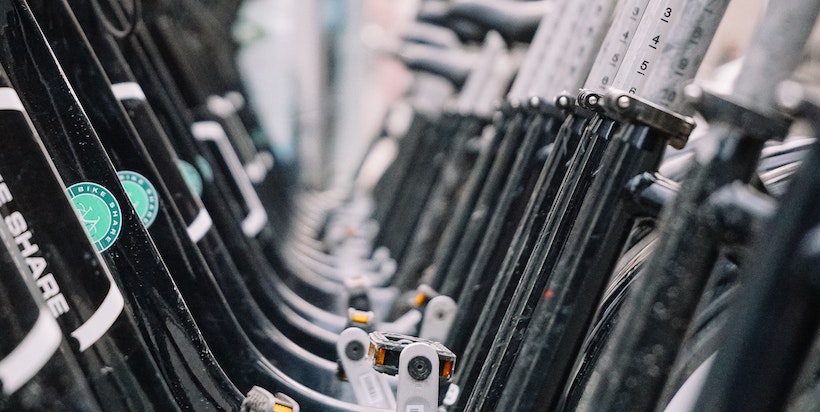
That's enough of the summary, though. Many times, caffeine is more interesting as a performance-enhancing supplement – beyond staying up late and being more productive, it can help you lift more, jump further, run faster, cut your times, and otherwise make you a better athlete.
According to the International Society of Sports Nutrition, caffeine is an effective way of enhancing different types of exercise performance when consumed in moderate amounts. A meta-analysis showed caffeine positively affects muscle strength, aerobic endurance, muscle endurance, exercise speed, and jumping performance.
(That covers a majority of sports right there!)
The results showed that caffeine affects your exercise performance by reducing fatigue, blocking the aforementioned neurotransmitter adenosine, and increasing your alertness and precision.
More relevant for athletes, it also increases the stimulation of your central nervous system, making physical exertion feel like it involves less pain and effort. This helps you become more effective and productive with each workout. Consider lifting, for example – much of your strength comes from CNS adaptation, and caffeine enables you to get the most out of what you can already lift.
For high-intensity exercises like strength sports, swimming, and sprinting, caffeine increases the number of fibers recruited in muscle contractions. This enables you to make forceful – and frequent – movements. Other studies have found that athletes or active adults who consume caffeine before working out have improved concentration.
Aerobic exercise is any physical activity that stimulates the increase of both your breathing and heart rate in a manner that you can sustain the entire workout session. Examples here are long-distance running, walking, hiking, dancing, and swimming. And don't worry, caffeine has plenty of benefits for endurance athletes.
Studies show that caffeine consumption in coffee or as a supplement taken one hour before exercise can boost endurance. More studies found that the use of coffee could help improve performance in running and cycling.
A 2017 study that involved male runners suggested that the consumption of caffeinated coffee an hour before a 1-mile event enhanced their performance. Their performance increased by 1.9 percent and 1.3 percent compared to runners who took a placebo or decaffeinated coffee.
All these studies prove that consuming coffee before aerobic exercise helps enhance overall performance. And if you're looking to incorporate caffeine into your endurance training, most of these studies looked at a dose of roughly 200 milligrams.
Anaerobic exercise is physical activity performed at a higher intensity and power – think HIIT workouts, short track cycling, speed skating, jump roping, lifting, and sprinting. These exercises break down glucose for energy without using oxygen. Due to the intensity, you can only perform them during short bursts of extreme effort.
Research studies have proven that caffeine can undoubtedly help improve your performance in anaerobic exercises. One particular benefit is the boost of speed endurance in high-intensity exercise between 60 and 180 seconds in duration.
Another helpful study is the 2017 meta-analysis that shows a considerable difference between caffeine and placebo trials. The overall results of this meta-analysis suggest that caffeine's use can have significant effects on high-intensity short-term exercises. The ingestion of caffeine can help improve components of anaerobic performance.
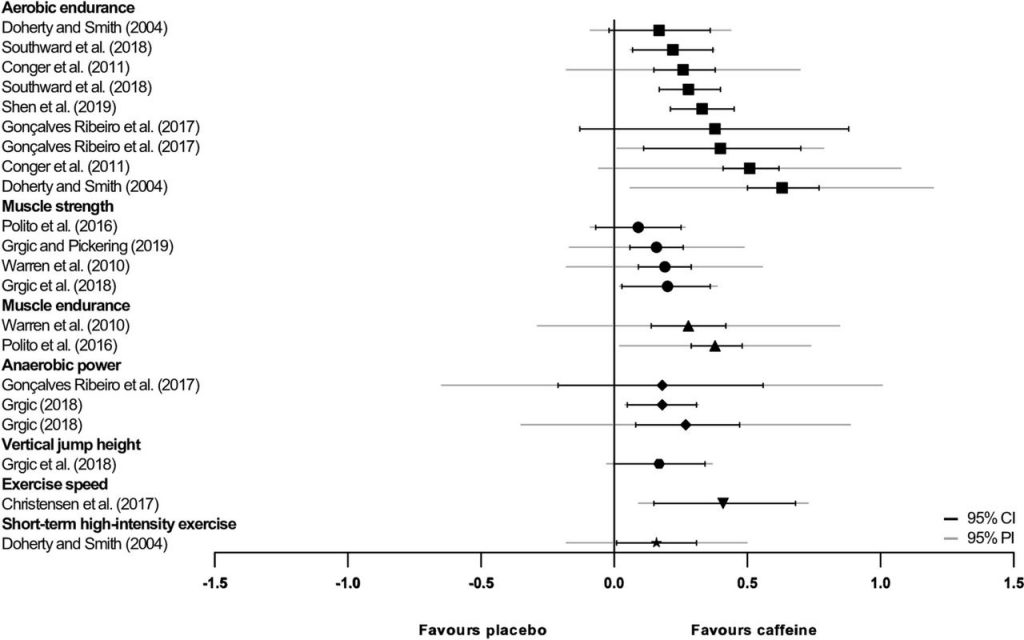
I'll say it: scientists have adequately studied the impact of coffee on athletic performance. Each study came up with conclusive results that showed its effect on different sports. And yes, most studies show an effect – there are very few negative or inconclusive studies in the mix.
It's such a benefit that the World Anti-Doping Agency once banned the use of caffeine before or during a competition, as most athletes took advantage of caffeine to gain an edge over their competitors.
But in 2004, the agency removed caffeine from the list of banned substances (but they left it in monitoring). This gave athletes the freedom to consume coffee, tea, energy drinks, and supplements before and during sports competition without fear of being penalized. And use it they do – caffeine dosing is pervasive in professional and advanced amateur sporting events.
Sports are a fantastic ecosystem, and a lot of that comes down to how varied they can be. While all sports are competitive – either you against yourself or you against others – they require different skills and strategies to thrive.
This section will take a closer look at the impact of caffeine from studies conducted on different sports. Of course, if you don't see your sport here, I bet caffeine can still help: just look for research on skills that are needed (e.g., running, jumping, or lifting).
Tennis is a demanding sport, as it requires a significant amount of both anaerobic and aerobic adaptation. A study in 2007 helped determine whether consuming a caffeinated soft drink before or during a tennis match can boost an athlete's performance. The study followed ten skilled tennis players whose sports performance was tested before and after consuming caffeine.
The results showed that study participants who consumed 6 milligrams of caffeine before and during their game improved their skill performance. The study also concluded that caffeine ingestion didn't have adverse effects on the players.
A study published in the International Journal of Exercise Science found that caffeine consumption can help improve tennis-serve accuracy, especially when a player is slightly fatigued.
Caffeine works. Famously, one tennis player who got a boost from drinking coffee during a play is Serena Williams. After losing the first set in the 2015 Hopman Cup 6-0, she asked for an espresso. She later came back and won the remaining sets 6-3 and 6-0. And yes, she joked later about the "miracle espresso."

Scientists are still investigating the effects of caffeine on basketball players – like tennis, basketball has a myriad of skills you require to be a good player. There have, however, been strides in identifying whether caffeine can improve basketball performance.
One particular study concluded that the ingestion of 3 milligrams per kg. of body mass of caffeine before exercise/practice:
That's a wide range of skills right there – it's safe to say these aspects led to an improvement in basketball performance during training and when playing the game.
According to a study conducted on 19 semi-professional soccer players, consuming a caffeine drink before a game affects performance positively. The study found that consuming a caffeinated beverage at 3 milligrams per kilogram of body mass doses helped soccer players increase their ability to sprint repeatedly.
The players could cover a longer distance at high-intensity during a pretend soccer game. They could also increase their jump height, and this may represent a significant advantage when competing for the ball during headers.
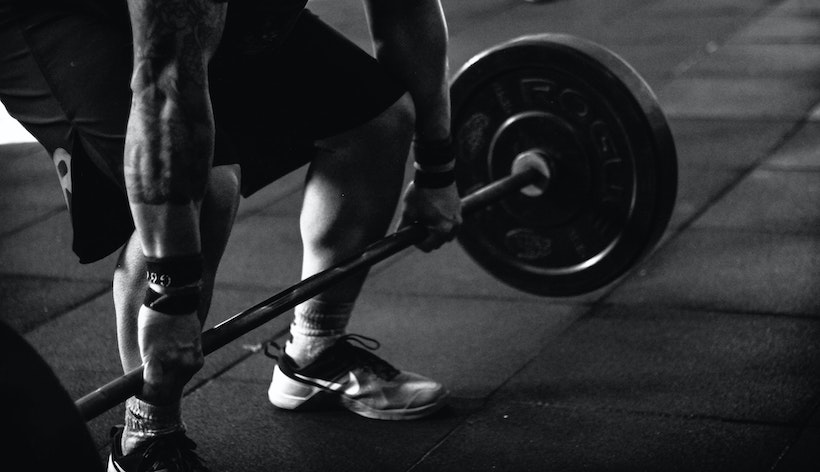
A paper published in the Journal of the International Society of Health Nutrition discussed the effects of coffee consumption on muscle strength. This paper reviewed several available studies that showed how caffeine ingestion could enhance strength in powerlifting competitions during the bench press, deadlift, and the squat.
The conclusion of this paper found that caffeine consumption in small doses before a competition could maximize a lifter's performance.
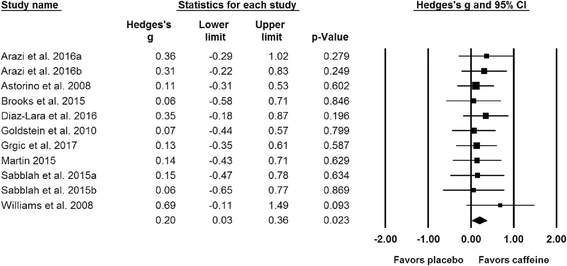
One of the reasons caffeine is popular with distance runners is its effectiveness on the track. According to a study published in the Human Kinetics Journal, participants who ingested caffeinated coffee before a 1-mile race had an enhanced performance compared to runners who didn't. Caffeine also reduces the runner's awareness of effort, making distance running easier.
One particular study investigated the effects of caffeine (and carbohydrate) ingestion on athletes' performance during a rugby match. The study concluded that players who consumed caffeine before the game had faster sprints and better motor skills. And yes, carbohydrates pre-game helped as well.
If there's one thing almost every cyclist loves, it's a cup of coffee. Studies have shown that consuming caffeine in doses of between 1.5 and 3 milligrams per kilogram of body weight helps increase a cyclist's performance by almost 4 percent.
It also helped improve mental concentration and motor performance. Caffeine, however, seemed to do little to reduce pain through the cycling competition.
One study studied how 15 participants performed after ingesting a caffeine drink or one without caffeine. The participants were then expected to perform standing spikes, spike jumps, squat jumps, and blocking jumps.
The research study concluded that participants who drank caffeinated drinks had a significant improvement in their physical performance compared to the other group. With better athletic performance, players had better accuracy and precision during the volleyball match.
According to an article published in the Canadian Science Publishing Journal, consuming caffeine can benefit golf players. Consuming a caffeinated drink before or during a golf tournament improves a golfer's performance by increasing their alertness and concentration.
(Of course, golf is a long game – if you play, skip the beer after the 9th hole and drink some cold brew.)
According to a British Journal of Nutrition published study, the consumption of moderate caffeine doses can improve a swimmer's performance. The participants noticed faster swim times, increased peak power, and improved handgrip force.
Specific studies have shown that caffeine can significantly improve your performance and times in multiple and single sprint sports.

Despite the benefits caffeine has to offer in sports performance, it's essential to understand the potential side effects. Many of these studies looked at the effects of roughly 200 mg of caffeine – more isn't necessarily better.
For players who become habitual caffeine drinkers, one of the impacts you're bound to notice is digestive issues like:
Caffeine acts as a stimulant that causes your body's response system to kick into action by increasing the production of the stress hormone cortisol. In this state, the nervous system is more active, which leaves other systems out in the cold – including the digestive system. Coffee, especially with its bitterness, increases the acidity in your stomach, which could lead to heartburn. Paradoxically, though, in people without GI issues it can even counteract heartburn!
Caffeine can also affect your digestive tract by causing both diarrhea or constipation. However, this happens when caffeine overly stimulates the smooth muscles that line the digestive system's lengths.
One of the most common effects of consuming caffeinated drinks regularly is anxiety and jitters. Caffeine helps increase alertness by blocking a brain chemical — adenosine — responsible for making you feel tired. It, however, triggers your body to release cortisol and adrenaline, which help increase energy.
When you consume caffeine at higher doses, your body works in overdrive, causing jitters and anxiety. According to several reports, consuming 1,000 milligrams or more of caffeine every day can cause jitteriness. That's not a hard and fast rule, though: even more moderate caffeine levels – especially for caffeine-sensitive individuals –can have the same effects.

Another negative effect of caffeine is how it disrupts your sleep, making it hard to fall asleep. This then causes a change to your circadian rhythm and ends up affecting your sleep routine. Caffeine can also affect the amount of time you can enjoy deep sleep.
However, you can plan around this effect. If you want to have a regular sleep rhythm and enjoy your daily coffee cup, consider keeping your consumption between 10 AM and 12 PM. And certainly – lay off the caffeine for at least 6 hours before you go to bed.
Despite being an excellent sports performance boost, it can also be addictive. Once addiction sets in, like any other drug, withdrawal can be challenging. According to several studies, withdrawal can be a challenge without help – if you cut your coffee, you should consider walking your consumption down slowly. (And don't do it before an event!)
Caffeine may cause dehydration, but it's unlikely to have much of an effect over time. Caffeine makes your body produce lots of urine, meaning you'll end up losing water and sodium. However, studies show that drinking a coffee cup is as hydrating as drinking a cup of water. So, the jury's out on this one – if you drink coffee, try to mix in water or other drinks.
According to a study published in the Medicine & Science in Sports & Exercise journal, taking caffeine during workouts can increase coagulation in your body, making it more likely for blood to form clots. Increasing the coagulation factor can be dangerous for people with risk factors like high cholesterol, high blood pressure, or obesity.

I'll admit that post was a doozy – I wrote it, haha. However, you can see that caffeine enhances all sorts of sport and exercise performance, for all manner of athletes.
Let's turn now to some specific questions about coffee and caffeine concerning sports so that you can apply the research to your training – and competition!
Many research studies have been done to understand the effects of caffeine on sports performance. However, these studies have shown that consuming caffeine at lower doses of 3 milligrams per kilogram of body mass (around 1.5 milligrams a pound, or roughly a cup of coffee per 60 lbs.) can help athletes perform better in most sports. Some studies saw benefits at higher doses around 6 milligrams per kilogram.
Consider starting with a lower dosage in training and walking it up if you don't see benefits.
If you're an athlete, looking to choose between caffeine or a pre-workout supplement can be challenging. Pre-workout supplements are multi-ingredient dietary formulas intended to help boost athletic performance and energy.
Some ingredients included in these supplements are nitric oxide, creatine, and caffeine. Many substances have some studies backing them, but creatine is unquestionably effective, featuring tons of high-quality studies pointing to its efficacy in sports. If you think you can handle it, combining black coffee with creatine will give you a boost.
Shorter? Pre-workout supplements work – but the 80/20 of the matter is caffeine and creatine are the two proven supplements for sports, which you can combine easily (and cheaply)
Yes, caffeine can help people who aren't professional athletes. The use of caffeine before and after your regular workout can increase alertness, improve your endurance, increase your strength, and reduce your perception of effort.
Because of caffeine's effectiveness in sports performance, it's easy to take more than you should before working out. Therefore, make sure you stick to that 3 to 6 milligrams per kilogram of body weight range we discussed above. (At least at first)
Bars and gum with caffeine can be effective. Supplements will work quickly and effectively too. But – regular coffee will work just as well. Consider trying espresso since there's a smaller volume of liquid, too – it might be more comfortable (and come with less risk you'll need the restroom!).
According to health experts, you should wait for approximately 30 to 60 minutes before you work out. Caffeine almost completely absorbs in your system between 15 and 60 minutes after consuming it.
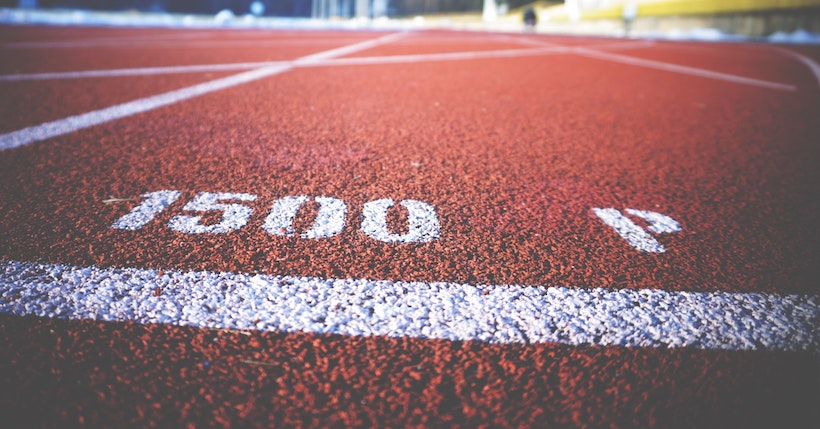
So there you have it – caffeine has an overwhelming amount of research into how it enhances athletic performance, and it stacks up well. Personally, I mostly work out at home (well, we all are doing that currently...), but I always have a couple of cups of coffee before my fasted workouts.
If you aren't using caffeine for sports yet – and you can handle it – incorporate some coffee or tea into your workout or training regimen. You could see some great gains (or time or stroke reductions, if you are a runner or golfer).
Let me know how it works for you!